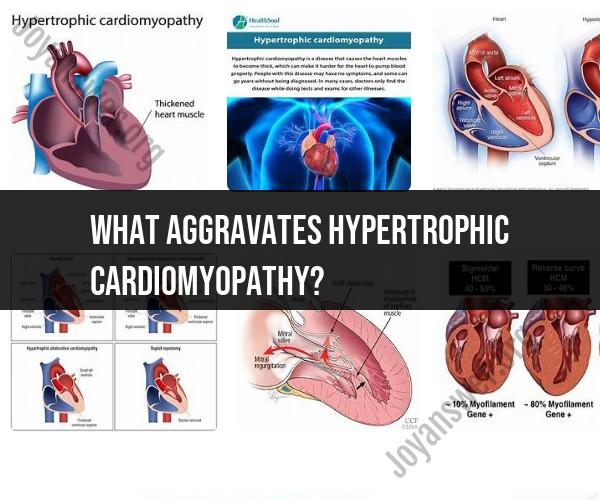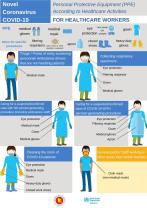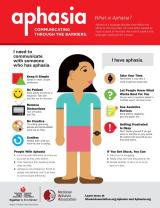What aggravates hypertrophic cardiomyopathy?
Hypertrophic cardiomyopathy (HCM) is a genetic heart condition characterized by the thickening (hypertrophy) of the heart muscle, specifically the left ventricle. While HCM is primarily a genetic disorder caused by mutations in certain genes, there are several factors and triggers that can potentially exacerbate the condition or lead to symptoms. These include:
Physical Activity: Vigorous physical activity and intense exercise can increase the risk of symptoms and complications in individuals with HCM. Strenuous exercise can cause the heart muscle to thicken further and may trigger arrhythmias or even sudden cardiac events. It's important for individuals with HCM to consult with their healthcare providers for guidance on safe levels of physical activity.
Dehydration: Dehydration can reduce the amount of blood returning to the heart, leading to lower blood pressure and decreased cardiac output. This can exacerbate symptoms in people with HCM. Staying well-hydrated is essential for those with the condition.
Certain Medications: Some medications, such as certain beta-blockers and calcium channel blockers, can be helpful in managing symptoms of HCM by reducing the workload on the heart. However, the choice of medication and dosage should be carefully monitored by a healthcare provider, as some medications may have adverse effects or interact with other drugs.
Arrhythmias: Arrhythmias (abnormal heart rhythms) can worsen the symptoms of HCM. These irregular heartbeats can lead to dizziness, fainting, or even sudden cardiac arrest. Managing arrhythmias with medications or procedures may be necessary.
Hypertension: High blood pressure can increase the workload on the heart and worsen hypertrophic cardiomyopathy. Managing blood pressure through lifestyle changes and medication, if necessary, is important for individuals with HCM.
Electrolyte Imbalances: Abnormal levels of electrolytes (such as potassium and calcium) in the blood can affect the heart's electrical system and trigger arrhythmias in individuals with HCM. Maintaining balanced electrolytes is crucial.
Pregnancy: Pregnancy can put additional stress on the heart, and women with HCM may experience more significant symptoms during pregnancy. Close monitoring and management by a healthcare provider are essential for women with HCM who are pregnant or planning to become pregnant.
Alcohol and Substance Use: Excessive alcohol consumption and substance abuse can negatively impact heart function and exacerbate symptoms in individuals with HCM. It's important to avoid or limit these substances.
Emotional Stress: Stress and anxiety can sometimes trigger or worsen symptoms in individuals with HCM. Stress management techniques and counseling may be beneficial for those affected.
Infections: Infections, particularly those affecting the heart muscle (such as myocarditis), can lead to complications in individuals with HCM. It's essential to seek prompt medical attention for any signs of infection.
Individuals with hypertrophic cardiomyopathy should work closely with their healthcare providers to develop a personalized management plan that takes into account their specific genetic mutation, symptoms, and risk factors. Regular check-ups and cardiac evaluations are crucial for monitoring the condition and adjusting treatment as needed.
Triggers and Risks: Factors that Aggravate Hypertrophic Cardiomyopathy
Hypertrophic cardiomyopathy (HCM) is a condition in which the heart muscle is thickened. This can make it difficult for the heart to pump blood efficiently. HCM is a genetic condition, but there are also a number of environmental factors that can aggravate the condition.
Some of the most common triggers for HCM include:
- Physical activity: Exercise can be beneficial for people with HCM, but it is important to avoid strenuous activity that could put too much strain on the heart.
- Stress: Stress can also trigger HCM symptoms. It is important to find healthy ways to manage stress, such as exercise, relaxation techniques, and therapy.
- Dehydration: Dehydration can thicken the blood and make it more difficult for the heart to pump. It is important to drink plenty of fluids, especially during hot weather and when exercising.
- Alcohol and caffeine: Alcohol and caffeine can also trigger HCM symptoms. It is important to limit or avoid these substances.
- Medications: Certain medications, such as some cold and flu medications, can also trigger HCM symptoms. It is important to talk to your doctor about any medications you are taking.
Managing Heart Health: Identifying Aggravating Factors in Hypertrophic Cardiomyopathy
It is important for people with HCM to be aware of the factors that can aggravate their condition. By identifying and avoiding these triggers, people with HCM can manage their heart health and reduce their risk of complications.
If you have HCM, it is important to work with your doctor to develop a personalized management plan. Your doctor can help you identify your triggers and develop strategies to avoid them. They can also monitor your condition and recommend treatment if necessary.
Lifestyle Choices: Avoiding Aggravation for Those with Hypertrophic Cardiomyopathy
There are a number of lifestyle choices that people with HCM can make to help avoid aggravating their condition. These include:
- Maintaining a healthy weight: Excess weight can put additional strain on the heart. Losing weight can help reduce this strain and improve heart function.
- Eating a healthy diet: Eating a healthy diet can help improve heart health and reduce the risk of complications from HCM. A healthy diet includes plenty of fruits, vegetables, and whole grains. It also includes limiting saturated and unhealthy fats, sodium, and cholesterol.
- Exercising regularly: Exercise is beneficial for people with HCM, but it is important to choose the right type and intensity of exercise. It is important to talk to your doctor before starting any new exercise program.
- Getting enough sleep: Sleep is important for overall health, including heart health. Most adults need 7-8 hours of sleep per night.
- Managing stress: Stress can trigger HCM symptoms. It is important to find healthy ways to manage stress, such as exercise, relaxation techniques, and therapy.
If you have HCM, it is important to work with your doctor to develop a personalized management plan. This plan will help you identify and avoid your triggers, make healthy lifestyle choices, and monitor your condition.













